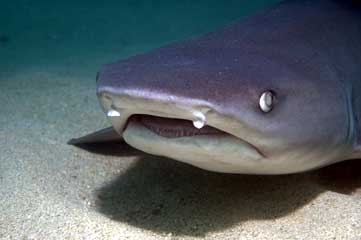| 
MEDIA statement
Monday, 12 March 2007
ALLIANCE ATTRACTS MASSIVE SUPPORT TO STOP SALT MINE
Extensive scientific evidence presented to EPA
More than 2,200 local and international submissions have
been made to the Environmental Protection Authority (EPA) calling
for the rejection of plans to build one of the world’s largest
salt mines along the environmentally-sensitive Exmouth Gulf.
Overwhelming opposition to the proposed project, both from within
Australia and internationally, has resulted from the ‘Halt
the Salt’ public information campaign initiated by a unique
alliance of peak environmental associations, commercial fishing
and pearling industry bodies and the peak recreational fishing body.
Today is the deadline for public submissions to be provided to
the EPA in response to mining company Straits Resources’ Environmental
Review and Management Program.
Alliance spokesman and Conservation Council of WA director Chris
Tallentire said the ‘Halt the Salt’ campaign had been
a huge success, attracting widespread concern and opposition to
the project which posed a massive risk to the delicate marine life
and existing sustainable industries in the region.
“The international interest in particular has been remarkable
– but not surprising – given that Straits has failed
to detail how it will dispose of toxic waste or how the water quality
or marine life in the Gulf will be affected,” Mr Tallentire
said.
“With public submissions closing today, we hope the EPA will
now consider all the risks and the devastating impact the project
will have on the local economy, the marine life and the valuable
eco-tourism in the region and block approval for the project,”
he said.
The Alliance has submitted a detailed submission to the EPA and
each member organisation within the alliance has also submitted
independent submissions on specific environmental issues stating
why the proposed project should be scrapped.
“The scientific evidence and arguments expressed publicly
by internationally-recognised experts are a clear demonstration
that the Alliance is not alone in its concerns and Straits is risking
damage to an environment that it knows little about.”
A range of submissions have also been made by individuals, research
bodies, educational institutions and commercial ventures who argue
the proponents do not have a full understanding of the Exmouth Gulf
environment, have failed to address basic questions and are unaware
of the impact they could make.
Wetlands expert Dr Vic Semeniuk, environmental hydrogeologist Dr
Colin Walker, former Department of Fisheries research director Dr
Jim Penn and marine ornithologist Dr Nic Dunlop have also detailed
significant risks to the sensitive environment and the failure of
the proposal to address these risks.
The MG Kailis Group, one of the largest commercial fishing operations
and employers in the Exmouth region, and Recfishwest, the State’s
peak recreational fishing body, which form a part of the Alliance,
back the concerns.
MG Kailis Group Compliance and Projects Manager Stephen Hood and
Recfishwest Executive Director Frank Prokop said the ERMP had failed
to alleviate numerous concerns with the proposal.
“This mine poses a massive risk to the existing sustainable
fishing, aquaculture, pearling and tourism industries of the region,”
Mr Hood said.
“Fishing and aquaculture are highly dependent on the maintenance
of high water quality and of the
natural ecological processes driving marine productivity. All these
activities will be threatened by
the proposed project, yet the ERMP dismisses the risks as ‘
relatively minor’, Mr Prokop said.
The Alliance also said the millions of dollars spent each year
by Australian and international visitors to WA’s unique coral
coast would also be under threat by the proposed salt mine.
The potential outcomes of the proposal include the following:
- The proposed salt mine would potentially secure an average
ten year salt price of $23/tonne – a poor return compared
to other local products such as pearls and prawns which rely on
the existing pristine environment for their ongoing viability.
- Commercial and recreational fisheries will see a reduction
in recruitment as a consequence of changes to habitat structure
and foodwebs resulting from this proposal.
- Three hundred (300) jobs in the region could be at risk from
the proposed project.
- Sustainable industries worth more than $165 million annually
in the region are at risk.
- Dredging and ship-loading activities could seriously degrade
critical habitats for threatened Dugongs and Green Turtles.
- There are no decommissioning plans or commitments detailed,
leaving the WA taxpayer exposed to the astronomical costs of restoration.
- The excavated inland harbour may expose significant areas of
acid generating sulphides as well as removing mangrove and algal
mat habitat.
- The silty bottom of the eastern Gulf is likely to be mobilised
by repeated dredging operations smothering marine producer habitats.
- The 300 metre-long Panamax bulk carriers, barges and service
vessels are likely to increasingly disturb and disrupt the use
of the area by megafauna such as Humpback Whales, Dugongs and
Sea-Turtles. The international shipping may transport exotic marine
pests from high-risk regions.
Media contacts
Chris Tallentire, Conservation Council of WA 0418 955 191
Stephen Hood, MG Kailis Group 0418 901 048

|


![]()

![]()
